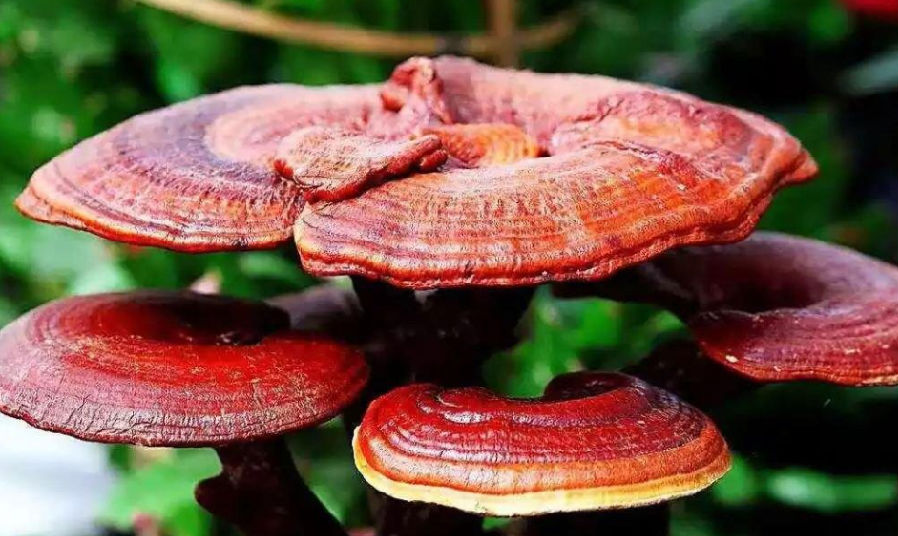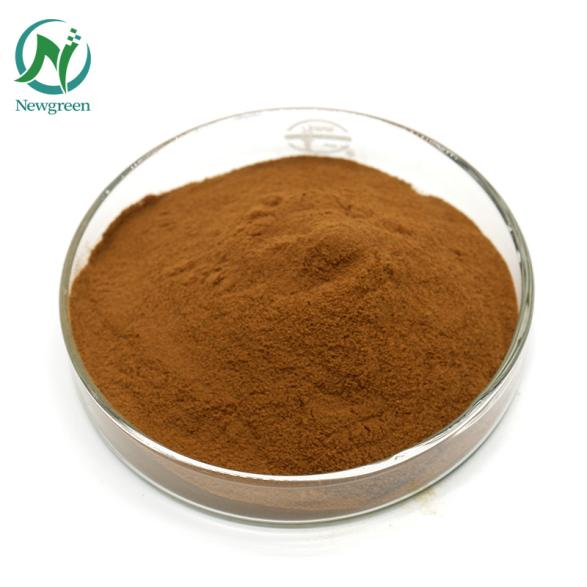
What Is Ganoderma Lucidum Polysaccharides?
Ganoderma Lucidum polysaccharide is a secondary metabolite of the mycelium of the Ganoderma genus fungus of the Polyporaceae family, and exists in the mycelium and fruiting body of the Ganoderma genus fungus.
Ganoderma Lucidum polysaccharide is one of the most effective ingredients of Ganoderma lucidum, which can improve the body's immunity, accelerate blood microcirculation, improve blood oxygen supply capacity, reduce the body's ineffective oxygen consumption in a static state, eliminate free radicals in the body, improve the sealing degree of the body's cell membrane, resist radiation, and improve the ability of the liver, bone marrow, and blood to synthesize DNA, RNA, and protein, and prolong life. Because Ganoderma polysaccharide has unique physiological activity and clinical effects, and is safe and non-toxic, it can be widely used in the pharmaceutical, food, and cosmetics industries.
Chemical Properties of Ganoderma Lucidum Polysaccharides
Ganoderma lucidum polysaccharide is a light brown to brown powder. It is a glucan composed of three monosaccharide chains with a helical stereoscopic configuration (tertiary structure). Its stereoscopic configuration is similar to deoxyribonucleic acid (DNA) and ribonucleic acid (RNA). It is a macromolecular compound with a molecular weight ranging from thousands to hundreds of thousands.
Ganoderma lucidum polysaccharide is insoluble in high concentrations of alcohol, slightly soluble in low concentrations of alcohol and cold water, and can be completely dissolved in hot water.
Ganoderma lucidum polysaccharide exists in the inner wall of the cell wall of Ganoderma lucidum. In addition to glucose, most Ganoderma lucidum polysaccharides also contain monosaccharides such as arabinose, xylose, galactose, fucose, mannose, and rhamnose, but the content is relatively small.
What Are The Benefits Of Ganoderma Lucidum Polysaccharides ?
The benefits of Ganoderma lucidum polysaccharides are a subject of ongoing research, and while there is promising evidence, further studies are needed to fully understand their potential effects. Some of the potential benefits that have been suggested by scientific research include:
1. Immunomodulatory Effects: Ganoderma lucidum polysaccharides may have the ability to modulate the immune system, potentially enhancing immune function and promoting overall immune health.
2. Antioxidant Properties: These polysaccharides are believed to possess antioxidant properties, which may help protect cells from oxidative damage caused by free radicals.
3. Anti-Inflammatory Effects: Research indicates that Ganoderma lucidum polysaccharides may have anti-inflammatory properties, which could be beneficial for managing inflammation-related conditions.
4. Potential Anti-Tumor Activity: Some studies have suggested that these polysaccharides may have anti-tumor effects, although further research is needed to fully understand their role in cancer treatment and prevention.
5. Support for Liver Health: There is evidence to suggest that Ganoderma lucidum polysaccharides may support liver health and have hepatoprotective effects.
What Is The Applications Of Ganoderma Lucidum Polysaccharides ?
The applications of Ganoderma lucidum polysaccharides are primarily focused on their potential health benefits. Some of the key areas where these polysaccharides are being explored for application include:
1. Dietary Supplements: Ganoderma lucidum polysaccharides are commonly used as a key component in dietary supplements, often in the form of capsules, powders, or liquid extracts. These supplements are marketed for their potential immune-supporting, antioxidant, and overall health-promoting properties.
2. Traditional Medicine: In traditional Chinese medicine, Ganoderma lucidum has been used for centuries, and its polysaccharides are an important component of this traditional practice. They are used to support overall health and well-being, often in combination with other herbal ingredients.
3.Health and Wellness Products: Ganoderma lucidum polysaccharides are also utilized in various health and wellness products, including functional foods, beverages, and topical formulations, with the aim of promoting immune health, reducing inflammation, and providing antioxidant support.
4.Cosmetic products: Ganoderma lucidum polysaccharides can be used in anti-aging skincare products. It can also be used in cosmetic formulations to help improve skin hydration and maintain skin moisture levels. As consumer interest in natural and plant-based ingredients grows, Ganoderma lucidum polysaccharides may be utilized as a natural, botanical ingredient in various cosmetic products, including creams, serums, and masks.
What Is The Side Effect Of Ganoderma Lucidum Polysaccharides ?
Ganoderma lucidum polysaccharides are generally considered safe for consumption and topical use, and they are well-tolerated by most individuals. However, as with any supplement or natural product, there is a potential for side effects, especially when used in high doses or in combination with certain medications. Some possible side effects and considerations include:
1. Allergic Reactions: Some individuals may be allergic to Ganoderma lucidum polysaccharides, leading to symptoms such as skin rashes, itching, or respiratory issues. If you have known allergies to mushrooms or other natural products, it's important to exercise caution when using products containing Ganoderma lucidum polysaccharides.
2. Interactions with Medications: There is a possibility of interactions between Ganoderma lucidum polysaccharides and certain medications. If you are taking prescription medications, especially those that affect the immune system or blood clotting, it's important to consult with a healthcare professional before using products containing these polysaccharides.
3. Digestive Issues: In some cases, high doses of Ganoderma lucidum polysaccharides may cause mild digestive discomfort, such as stomach upset or diarrhea. It's advisable to follow recommended dosages and monitor your body's response when using these products.
4. Pregnancy and Breastfeeding: There is limited research on the safety of Ganoderma lucidum polysaccharides during pregnancy and breastfeeding. It's best to consult with a healthcare provider before using these products if you are pregnant or nursing.
As with any natural product, it's important to use Ganoderma lucidum polysaccharides responsibly and to consult with a healthcare professional, especially if you have any underlying health conditions or are taking medications.



Related Questions You can Be Interested In :
Other names for Ganoderma Lucidum :
Lingzhi , Reishi Mushroom
Is Lingzhi only found in China?
Lingzhi, also known as Ganoderma lucidum or reishi mushroom, is not only found in China. It is a type of mushroom that grows in various regions around the world, including Asia, North America, and Europe. In addition to China, Lingzhi is also cultivated and harvested in countries such as Japan, Korea, and the United States. It has a long history of use in traditional medicine and is valued for its potential health benefits.
What is the active ingredient in Ganoderma lucidum ?
The active ingredients in Ganoderma lucidum, also known as Lingzhi or reishi mushroom, are believed to be a group of bioactive compounds, which include polysaccharides, triterpenes, and other potentially beneficial substances. These compounds are thought to contribute to the various health benefits associated with Ganoderma lucidum.
1. Polysaccharides: Ganoderma lucidum contains polysaccharides, which are complex carbohydrates known for their potential immune-modulating and antioxidant properties. These polysaccharides are often considered one of the key bioactive components of Ganoderma lucidum.
2. Triterpenes: Another important group of compounds found in Ganoderma lucidum is triterpenes, including ganoderic acids. Triterpenes are believed to have potential anti-inflammatory, antioxidant, and other health-promoting effects.
3. Other Compounds: Ganoderma lucidum also contains various other bioactive compounds, including amino acids, proteins, and enzymes, which may contribute to its overall health benefits.
What diseases are treated with Ganoderma?
Ganoderma lucidum, also known as Lingzhi or reishi mushroom, has been traditionally used in various cultures to potentially support health and well-being. While it's important to note that Ganoderma lucidum is not a cure for any specific disease, it is believed to have potential benefits for overall health and may be used as a complementary approach to support the management of certain health conditions. Some of the diseases and health concerns for which Ganoderma lucidum is sometimes used include:
1. Immune Support: Ganoderma lucidum is often used to potentially support and modulate the immune system, which may be beneficial for overall immune health.
2. Stress and Fatigue: It is sometimes used to potentially alleviate stress and reduce fatigue, promoting a sense of well-being.
3. Respiratory Health: Some traditional practices use Ganoderma lucidum to potentially support respiratory health, particularly in the context of traditional Chinese medicine.
4. Liver Health: Ganoderma lucidum is believed to have hepatoprotective properties and may be used to potentially support liver health.
5. Cardiovascular Health: Some research suggests that Ganoderma lucidum may have potential benefits for cardiovascular health, including supporting healthy blood pressure and cholesterol levels.
It's important to emphasize that while Ganoderma lucidum is associated with these potential health benefits, scientific research is ongoing, and further studies are needed to fully understand its effects on specific diseases and health conditions. As with any natural product, it's advisable to consult with a healthcare professional before using Ganoderma lucidum, especially if you have any underlying health conditions or are taking medications.
Is it OK to take reishi everyday ?
Taking reishi (Ganoderma lucidum) daily is generally considered safe for most people. However, as with any supplement or natural product, individual responses can vary, and it's important to consider certain factors before incorporating it into your daily routine:
1. Dosage: It's important to follow the recommended dosage provided on the product label or as advised by a healthcare professional. Taking excessive amounts of reishi or any supplement may lead to potential adverse effects.
2. Health Conditions and Medications: If you have underlying health conditions or are taking medications, it's advisable to consult with a healthcare professional before taking reishi daily. This is particularly important if you have immune system disorders, are on blood-thinning medications, or have other specific health concerns.
3. Allergies: Individuals with known allergies to mushrooms should exercise caution when taking reishi, as allergic reactions are possible.
4. Pregnancy and Breastfeeding: If you are pregnant or breastfeeding, it's important to consult with a healthcare provider before using reishi supplements.
Post time: Sep-12-2024





